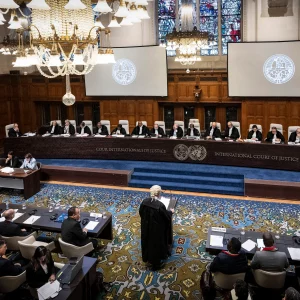RESOLVED: The People’s Republic of China should establish a presidential limit of three terms.
Affirmative Constructive Speech (Sunny Malhotra)
Having no term limits is detrimental for the future of the Chinese population and government. Xi Jinping’s abolishment of term limits is already taking course in the increased censorship of the people. BBC noted Sina Weibo, a popular social media blogging website in China, has banned users searching “Winnie the Pooh” to avoid users making derogatory posts against Xi. Bloggers often compare the physical characteristics of Xi with the bear, and use the similarity to portray “subversive” messages on the internet. Other banned terms are “disagree” and the letter “N” in a mathematical concept where N=term limits. One blogger’s removed post was N>2 (BBC). Increased censorship after periods of liberalization is regressive, but more objectively has been tried before by Mao and lead to disastrous consequences. Mao’s Hundred Flower Campaign in 1956 was designed to grant greater freedom of thought and speech. However, after the government deemed that the criticism had gone too far, the retribution faced by the critics was severe. Many lost their jobs, were forced to do manual labor, or were sent to prison. Although it may seem unlikely to many that Xi would take it this far, there is no guarantee that the next president for life will not. Dissent and disagreement is necessary for the exchange of ideas and ultimately necessary for progress. When disagreement is discouraged within the Communist Party of China, its consequences could weaken the integrity and strength of the nation.
Xi used his anti-corruption campaign in 2017 to eliminate his political rivals. This McCarthy-type agenda is not only morally questionable but bad for China’s position in the world from a political and practical perspective. The Economist writes, “At a time when he is trying to boost China’s image globally as a modern, outward-looking and responsible state, the political system he governs seems premodern, opaque and treacherous.” China is primed to take the spot of U.S. as the global power, but this may be a step in the wrong direction, as it contradicts the notion that they are a stable nation that can help push the world towards progress.
From a practical perspective, abolishing term limits directly encourages strongman politics. Xi has proven in the past that he is willing to eliminate political opposition, but even if he chooses not to do away with all those who oppose him, there is no guarantee that the next president will do the same. Having term limits eases the tension of party leaders and political opponents of the president. Former President Deng Xiaoping saw the chaos of the latter years of Mao and implemented reforms to ensure the stability of the government. Deng ensured this through reforms involving mandatory retirement age for party members, and a clear passage of succession from one president to another. Term limits are necessary to ensure a stable nation. It makes the acts of the president reversible to an extent, allowing progress to be made through various perspectives being considered.
Eliminating opposing viewpoints and those who do not think in a similar way leads to the President for life surrounded by yes-men. Instead of reason driving the discourse of a nation, it is one person’s opinion that is validated through the nodding of elites fearful of the next purge. With Xi Jinping’s anti-corruption campaign and the historical precedence for leaders to purge opposition, it is not out of the realm of possibility that a Chinese president in the future would abuse this power for his or her own betterment. Even if Xi is doing this to implement his reforms, there is nothing stopping the next president, or the one after that, from using the powers of the presidency to the extent that will damage China.
It may be argued that Xi needs unlimited term limits to implement the plans he has right now. However, fifteen years is plenty of times to start, finish, and analyze policies that push a nation forward. If Xi does start his plans for his third term, five years will be enough time to see if the plans are working or not. If the presidential terms are unlimited and the president is surrounded by yes-men, catastrophic plans would go unopposed and have grave consequences on the nation.
It is not in China’s best interest to eliminate term limits. Having a limit of three terms for president would allow ample time to start and complete plans, would ensure the stability of succession and the nation. While Xi’s reign as president for life may not seem like the worst idea, the same cannot be said for the reigns of his successors.
Cross-Examination of the Affirmative by the Negative
JL: How does abolishing presidential term limits created “increased censorship”? How can you prove a causal link?
SM: Xi has taken steps towards increasing censorship from the announcement of his plan to abolish term limits. Even before this, Reporters Without Borders ranked China’s situation as very serious when it comes to censorship. Xi has taken steps in the distant past and very recently to increase censorship and discourage disagreement. To think he would ease up is naive and to assume this is going to increase is reasonable and justified.
JL: You state that a limit of three terms would provide “ample time to start and complete plans”. How do you reconcile this statement with Xi Jinping’s long-term environmental plan that has an expected deadline in 2030?
SM: The deadline is 2030 and Xi’s third term would expire in 5 years. 5 more years would give China ample time to decide whether it is heading in the right direction or whether it would be more cost effective to abandon the project and switch to an alternative. Being as it is Xi’s pet project, he has the most to lose by discontinuing it. Taking the fate of the project away from him provides a more objective look on to the success and progress after 5 years.
JL: You seem to think that this nominal elimination of presidential term limits is somehow threatening the whole stability of the regime. Presidents are nominated by the previous president; if Xi were to nominate a new president and put him in power and step down from presidency while maintaining his position as General Secretary and Chairman, would the problems you cite (opposing viewpoints, strongman politics, instability) dissipate?
SM: Yes. After Mao’s death, his successor Deng Xiaoping implemented a series of reforms that contradicted Mao’s rules and regime. One of those democratic reforms is being repealed right now through the abolishment of term limits. Opposing viewpoints are not completely weeded out just temporarily silenced. This temporary silence and fear of admonishment can be lifted through the changing of presidents. However, as power is consolidated more and more, the voice of opposition decreases dramatically.
JL: Should China prioritize nominal democratization or the mitigating of climate change while it is still possible? Which would you consider is better for both Chinese citizens and the global community?
SM: Yes. Climate change is part of the external reason that Xi is abolishing term limits. But five more years and limiting to three terms will allow him to take active steps towards fighting climate change. It’s in no president’s best interest to allow the Chinese population to suffocate in their cities so to pit democratization against climate change is not the question. The toxic air of China’s cities kills millions of people. Which president of China would not take steps towards a cleaner future? Furthermore, the investment in solar panels is a step already being set in motion. In five years, China can both actively fight climate change and commit to the pursuit of democratization.
Negative Constructive Speech (Jennifer Li)
The international community’s attention and energy has been less focused on criticizing the internal structures of China and more centered on the international calamity of global warming and environmental damage. From a global perspective, then, Xi Jinping’s elimination of presidential limits is not detrimental to the interests of the global community. His promises to do his part in halting global warming by revolutionizing China’s energy infrastructure in the next few decades proves that his rule is net better for the environment.
Xi Jinping knows that his green energy plans will take more time to carry out to completion than the two limits he would have as president. His plans are incredibly ambitious—30% renewable energy for the country by 2030—and it is exactly because he does not trust anyone else to carry out his ambitious plans that Xi Jinping is intent on preventing internal factions from rising up and disrupting his plans. It is unquestionably in the interest of the island states slowly being flooded by rising seas, and countries hesitating to decisively take pro-environmental measures, that Xi Jinping is able to exercise his environmental plan.
Environmental treaties are incredibly tricky; they are often merely declaratory rather than contractual. The problem with key state actors in the past decades is that changing domestic landscapes enable democratically elected leaders to easily renege on treaties endorsed by their predecessors. Bush abandoned the Kyoto Protocol. Obama entered the Paris climate agreement. And in Trump’s first year of presidency, he kicked the Paris agreement to the curb. Notice a pattern? Environmental treaties require long-term solutions, often with end goals set decades away, and are therefore incredibly difficult to maintain in countries where democracy is valued over the continuation of leadership for the sake of stability. Looking at this political development in China means one important thing for foreign states: stability of rule and subsequently, a promise of green energy delivery.
From the perspective of a common everyday lower- or middle-class Chinese citizen, Xi’s consolidation of power also doesn’t disadvantage them either. Xi Jinping is implementing major political and economic reforms in China that, along with his environmental plans, will address the three major problems facing his country: pollution, inequality, and corruption. His anti-corruption plans, while used to eliminate elite political opposition, are also changing the political landscape across China. Bureaucrats, large and small, are now scared of losing the positions they thought they could never be ousted from. They do not dare to write off personal expenses with the taxes of the people. If Xi Jinping is able to persist with his anti-corruption policies, this political move will transform China’s political culture for the better.
Yes, the elimination of presidential term limits may take China a step away from liberalization and democratization. But how far exactly? Xi Jinping is already the General Secretary of the CCP (Chinese Communist Party) and Chairman of the Military Commission, both of which exist without terms. Even if Xi Jinping did not retain his presidential role, he would hold the two far more important office positions. The opaque internal dynamics of the party, even with the formal fanfare of presidential limits, contributes to an evidently consultative authoritarian regime.
China’s political structure is a fact and doesn’t need to be denied, much like global warming and its disastrous effects that overcome all other concerns facing the global community. Authoritarianism is inevitable within Chinese borders, but climate change and corruption are not. Xi’s decision to retain his power will pay off dividends in the future; the alternative is a disastrous list of half-finished projects that will be inevitably scrapped at the expense of the Chinese people and the global environment.
Cross-Examination of the Negative by the Affirmative
SM: The opposition only discusses Xi Jinping, but what happens to the next president? Isn’t abolishing term limits a dangerous precedent to set?
JL: The issue at hand isn’t really the nominal elimination of presidential limits but the consolidation of power and a symbolic shift in the influence of a particular man, Xi Jinping. The removal of presidential limits itself doesn’t give Xi more power. Xi Jinping being able to convince Congress to remove the presidential limit simply demonstrates his growing power. If we’re worrying about the authoritarian rule of the next president who could potentially make bad decisions, that president will have to acquire allies and people who agree with his policies like Xi in order to wield influence. The mere elimination of limits does not give the next president this terrible and all-domineering political force that you so fear. That being said, I have made no attempt to deny that abolishing term limits takes the Chinese government a step back in democratization. My argument is instead that stopping climate change and global warming is more important right now than nominal declarations and democratization when it is crucial for the world that we halt climate change now or else it will perhaps be irreversible.
SM: Although two terms may not be enough for Xi to start the plans he wants to, isn’t five more years enough to analyze whether Xi’s plans are working and heading in the right direction and therefore justified to be continued by the next president?
JL: You could try and argue the same about Obamacare “heading towards the right direction”, and therefore is “justified to be continued by the next president”, but that won’t get you far. Trump still vowed to repeal it when he came into office. “Justified to be continued” is a naïve way to look at policy that unfortunately reflects very little on what policies will actually be continued. You assume “justified” to be some objective qualification of policy that everyone can discern and will, therefore, follow and sustain. Besides, environmental plans are unique in that they are made with the aim of having long-term benefits that can take more than a few years to see. Xi Jinping’s environmental plan is destined for completion in 2030. The benefits of halting temperature increases and rising tides cannot be measured on the same time scale as the various consequences of massive changes in infrastructure, investment, and shutting down of oil refineries and energy industries. Therefore, the success of an environmental plan cannot be determined by a trivial random limit of five years and then immediately halted or advanced by the next president.
SM: If Xi already is so influential in positions that do not have term limits, why does he need to get rid of term limits for the presidential position? Isn’t it contradictory to argue that the position of president is both important and not important to Xi?
JL: Xi doesn’t need to get rid of the term limit, but it certainly shows and symbolically asserts his sway and power in Congress. It shows the stability of his power (both to his party and the rest of the world), but it certainly doesn’t add any life-changing powers to his credit.
SM: Besides environmental implications, there are global and ethical implications to Xi suspending term limits. Can China emerge as a global power worthy of the trust of other nations if their political system and leader punishes dissent and disagreement?
JL: Yes. The question of ‘can’ should have been asked before China became the largest economy in the world. China has already emerged as a global power under its authoritarian regime. You overestimate the ethical concerns of other states when negotiating trade deals and lack understanding of the dynamics of the international realm.
Affirmative Rebuttal (Sunny Malhotra)
Every step Xi Jinping has taken has been to consolidate power for himself. Although it may be gilded with a golden cover of prosperity, climate awareness, and progress, the fact remains his moves towards power are dangerous to the people and the nation. Though the opposition may try to argue the benefits of the short term, the question of the long-term remains. China has a history of authoritarian leaders that have used their power for disastrous purposes. The opposition is discouraged, dissent is punished, and livelihoods were stripped from those who dared to disagree with Mao Xi. Since his expansion of term limits, the Communist Party wielded the hammer of censorship and struck major social media sites and shift the Chinese media narrative to the positives of this contentious move. By limiting term limits to three consecutive terms, the president has plenty of time to start new projects for the betterment of the nation, opposition to dissent will be limited by time, and the world will see that China is committed to progress.
Five more years will give Xi enough time to start his big initiatives and will allow for discussion about the trajectory and feasibility of the projects. The limit to Xi’s term will provide a sense of security to those who fear retribution for disagreement. Furthermore, the opposition discusses the climate change benefits that will follow Xi rule. Though there may be short-term benefits, it can be argued their solar initiative is part of a bigger plan for electric car monopoly. Furthermore, it is estimated that 4 million people die every year in China because of the pollution. It is in not only Xi’s best interest but ANY president’s best interest to switch to greener energy sources. The benefits of these short-term, short-sighted projects are not enough to justify eliminating term limits. It is a power grab by Xi that has puts the reputation and stability of China at risk. His initiatives are something that can be carried on by a successor after five years, the censorship and crackdown on dissent is dangerous and immoral, and the implications for his successor are too great and unpredictable for it to rationalize unlimited terms.
Negative Rebuttal (Jennifer Li)
At the end of this debate, climate change remains the primary issue and overshadows the repetitive and tedious concerns that the Affirmative poses.
When it comes to prioritizing climate change policy over nominal democratization, the Affirmative makes flawed assumptions about climate change policy in order to argue that these two issues do not often conflict. The Affirmative attempts to dismiss the common problem of states reneging on climate change policies by stating that the next president would address climate change to the fullest extent because “which president of China would not take steps towards a cleaner future?”. Which indeed… to that, I ask which president of China, besides Xi, or of any developing country (such as India) has taken steps to combat climate change? It is a false claim, contradicted by reality, and if the Affirmative is content to believe that our world will simply revolutionize its energy industries because “which president wouldn’t?”, then our world will be soon buried under ashes.
If we are to agree that mitigating climate change is one of the most important initiatives of our time, then the international community must appreciate that stability of rule will lead to stability of policy.
The Affirmative argues that nominal eliminations will result in increased censorship, strongman politics, etc. But the Affirmative has been unable to prove that these worsen simply with the term limits ending or more specifically, Xi not stepping down after three terms, which also shows how arbitrary this 5-year cut off is in deciding the success of environmental policies and marking the watershed moment of sure authoritarian catastrophe and democratization. In the end, it boils down to prioritizing the issue of climate change in a world where respected countries have forsaken the environment in its crucial time. Mother Earth could care less about your state’s political system.
Featured Image Source: Henry Wong/South China Morning Post





Be First to Comment